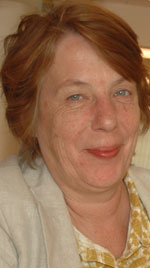Postal address: Box 792, SE-220 07 Lund, Sweden
Web page: http://www.ace.lu.se/
Contact persons: Deputy Director & Masters Programme Coordinator Monica Falk Lindberg, phone: +46 (0)46 222 37 44
 • A Programme for East and South-East Asian Studies was established as an interdisciplinary network at Lund University in 1984. It was initiated by the legendary sinologist, linguist and folklorist Kristina Lindell (1928–2005) – read more about Dr. Lindell.
• A Programme for East and South-East Asian Studies was established as an interdisciplinary network at Lund University in 1984. It was initiated by the legendary sinologist, linguist and folklorist Kristina Lindell (1928–2005) – read more about Dr. Lindell.
As the result of a special Swedish government initiative, in 1997 this network was transformed into the present Centre for East and South-East Asian Studies (ACE), is focused on research and education concerning modern East and South-East Asia. Research carried out at the Centre is primarily in the fields of the social sciences and the humanities. It is headed by Professor Roger Greatrex, a scholar on China who also keeps a great personal interest in India, and has tried to initiate research comparing India and China. South Asia was for a long time totally excluded from the activities of ACE, but the Centre now also partly deals with South Asia, since course material is included in the masters programme. Professor Emeritus Roger Greatrex has also developed collaboration with Pune University in India, where he spent time both in 2011 and 2012 as a scholarship holder through the Erasmus Mundus Action 2 programme. Through the same programme, a few Indian researchers have also been affiliated to the Centre since 2009. More information about their research projects below.
Two India related researchers, Anna Lindberg (Director for SASNET from 1 July 2007-31 Dec 2016) and Sidsel Hansson, have held post-doc positions at ACE.
• The more open approach towards South Asian studies is reflected in the Masters Programme in Asian Studies which started at the Centre in September 2003 (more information on the Masters programme, see below). In the year preceding the start of the programme, a working group consisting of teachers and researchers at the Faculties of Humanities and Social Sciences at Lund University carried out the planning work for the South Asian track in close collaboration with SASNET.
Dr. Jan Magnusson, now assistant professor at the School of Social Work, Lund University, but previously the first webmaster/secretary of SASNET (in its initial stage in the year 2000), was a key person in the planning process. When the Masters programme started he was therefore employed by ACE as Director of Studies during the period 2003-2005. More information about Jan’s South Asia related research, see below.
Dr. Magnusson participated in the SASNET workshop on ”The role of South Asia in the internationalisation of higher education in Sweden” held in Stockholm 28-29 November 2006, where he gave a presentation about experiences from Lund University’s Masters Programme in Asian Studies both in the session dealing with ”South Asian students in soft sciences in Sweden” (read the presentation, as a pdf-file); and in the session dealing with ”Sending students to South Asia” (read this presentation, as a pdf-file).
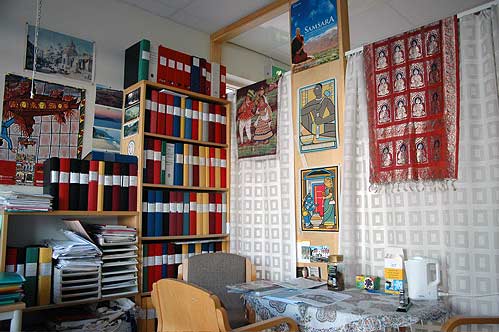 • ACE has another strong South Asia connection in the fact that SASNET’s root node office is located within the premises of the centre in the Alfa 1 house at Ideon Research Village in Lund (photo from the office to the right). The root node office moved here in November 2003, from its previous location at the Lund University International Office in central Lund.
• ACE has another strong South Asia connection in the fact that SASNET’s root node office is located within the premises of the centre in the Alfa 1 house at Ideon Research Village in Lund (photo from the office to the right). The root node office moved here in November 2003, from its previous location at the Lund University International Office in central Lund.
Karl Reinhold Haellquist Library Donation
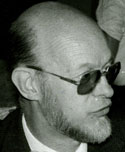 In 2004 Inger Sondén-Haellquist donated a unique collection of 5 000 South Asia related books, journals, videotapes and pamphlets on various aspects of South Asian studies to SASNET/Lund University. The books come from the private library of her late husband, the renowned Swedish scholar Karl Reinhold Haellquist who passed away in 2000.
In 2004 Inger Sondén-Haellquist donated a unique collection of 5 000 South Asia related books, journals, videotapes and pamphlets on various aspects of South Asian studies to SASNET/Lund University. The books come from the private library of her late husband, the renowned Swedish scholar Karl Reinhold Haellquist who passed away in 2000.
He was a historian specialised on South Asia, and worked for many years at the Nordic Institute of Asian Studies (NIAS) in Copenhagen. The donated books were supposed to form a Memorial Collection at Lund University’s Asian Library (located in the same building as ACE and SASNET). More information on the book donation.
 In January 2005 SASNET gave ACE (through Jan Magnusson) SEK 70 000 as a planning grant to what was called the “Haellquist Book Donation Project.” The money was used to start cataloguing the donated books, and a room was set aside for the purpose. Parts of the collection have later, with funding from SASNET, been catalogued and displayed in the Asia Library (at Scheelevägen 15 D, first floor).
In January 2005 SASNET gave ACE (through Jan Magnusson) SEK 70 000 as a planning grant to what was called the “Haellquist Book Donation Project.” The money was used to start cataloguing the donated books, and a room was set aside for the purpose. Parts of the collection have later, with funding from SASNET, been catalogued and displayed in the Asia Library (at Scheelevägen 15 D, first floor).
In June 2007 the Crafoord Foundation decided to give SEK 120 000 as a grant to SASNET in order to digitalize Karl Reinhold Haellquist’s private archive – part of the collection. This work has been carried out by a hired librarian, Erik Svanström, during the Fall 2008.
See the new Karl Reinhold Haellquist Memorial Collection (KRHMC) web site on Mahatma Gandhi, launched in December 2008.
In 2009, the remaining part of the donation has been catalogued by Erik Svanström. It was formally inaugurated by the Indian Ambassador to Sweden, Mr. Balkrishna Shetty, at a function at the Asia Library on Thursday 10 September 2009. More information.
Through its involvement with the Masters Programme in Asian Studies (including a South Asia track), SASNET has also been actively working to open up the Lund University’s Asia Library (Asienbiblioteket at the ground floor in the same building as ACE and SASNET, entrance Scheelevägen 15 C) to include South Asia related literature besides its existing collections of literature on East and South-East Asia. Since a couple of years, the course literature for the Masters programme is available in the Asia Library, and in January 2007, the SASNET board decided to set aside SEK 25 000 to buy and catalogue books on modern South Asian studies for the Asia Library. A number of books from SASNET’s root node office collection (more information) were also donated to the Asia Library.
From October 2007, a list of SASNET’s first contribution of more than 100 volumes to the Asia Library was available through the Asia Library web page.
Go for the 2007 list of South Asia books in Lund University’s Asia Library (as a pdf-file).
Many more South Asia related books have been bought by SASNET in 2008, and have been donated to the Asia Library. Go for the 2008 list (as a pdf-file)
Research connected with South Asia:
• Dr Sidsel Hansson was previosly connected to the Department of History of Religions, Centre for Theology and Religious Studies (more information about her research at CTR), but later held a post-doc position at the Centre for East and South-East Asian Studies (ACE) from 2004 till 2008. She is still connected to ACE as a lecturer on specific Masters programme courses.
During the period April–November 2008, Dr. Sidsel Hansson substituted as Director of SASNET. Since December 1, 2008 she is working at Lund University’s Section for International Relations, as co-ordinator for one of the Erasmus Mundus External Cooperation Window India programmes, lot no 13, programme 2. More information on the EMECW 13 web site.
From August 2010, Dr. Sidsel Hansson is back at ACE as a researcher on a part-time basis, while still coordinating the Erasmus Mundus project on an other part-time.
In January 2004 Dr. Hansson was given a three-years grant from Sida/SAREC to carry out a major research project on hinduisation and women’s groups within the environmental movement in Rajasthan. The project is called: ”Gender, Education, Religion, and Environment. Women’s activism and self-education in an environmental risk district in northwest India”. More information.
The project was carried out in collaboration with Pernille Gooch, Division of Human Ecology, Dept. of Ethnology, and the MA student Behnoush Payvar.
Project Abstract: The project studies the nexus of social, cultural and religious factors influencing underprivileged women’s access to educational resources and civil society agency in an environmental risk region. It discusses the most important factors obstructing/facilitating the process. In order to gain an understanding of the dynamics it is essential to look into women’s efforts to organise themselves at the micro level. The analysis focuses on the women as actors, and on the strategies that they use. A main hypothesis in the project is that women’s empowerment depends on their capacity to strategically use their environmental knowledge which affords status in some contexts, and their religious traditions which affords legitimacy in other contexts. Data from the ethnographic study will be compared with data from secondary sources in order to discuss education and gender vulnerability in environmental risk areas and the consequent policy implications.
![]() Together with Dr. Catarina Kinnvall, Dept. of Political Science, Sidsel was also involved in planning the independent, interdisciplinary 15 ECTS researcher training course on ”Religion, Conflict and Identity in South and Southeast Asia”. It ran for the first time in October 2006, and aimed at supplying students with overviews of the broader religious developments in South and South East Asia. Supervision was given in the form of seminars first in Lund and then in Copenhagen.
Together with Dr. Catarina Kinnvall, Dept. of Political Science, Sidsel was also involved in planning the independent, interdisciplinary 15 ECTS researcher training course on ”Religion, Conflict and Identity in South and Southeast Asia”. It ran for the first time in October 2006, and aimed at supplying students with overviews of the broader religious developments in South and South East Asia. Supervision was given in the form of seminars first in Lund and then in Copenhagen.
Similar courses were included in a new Nordic Summer University (NSU) programme initiative that Dr. Hansson was instrumental in realizing. ”South Asia and the challenges of the 21st Century” which was one of the themes for the NSU during the period 2008-10. More information.
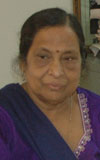 In August 2006, Dr. Hansson received a SASNET guest lecture grant to invite Dr. Bidyut Mohanty (photo to the right) from the Women’s Studies Department at the Institute of Social Sciences (ISS) in New Delhi, India. Dr. Mohanty came to Sweden in October 2006 and gave lectures at Lund University and Göteborg University. She lectured about ”One million women grasstroots (village council) leaders: How do they govern the communities?”.
In August 2006, Dr. Hansson received a SASNET guest lecture grant to invite Dr. Bidyut Mohanty (photo to the right) from the Women’s Studies Department at the Institute of Social Sciences (ISS) in New Delhi, India. Dr. Mohanty came to Sweden in October 2006 and gave lectures at Lund University and Göteborg University. She lectured about ”One million women grasstroots (village council) leaders: How do they govern the communities?”.
6–7 March 2008, the Swedish national Gender and Development Network (GADNET) organised a so-called Dreamcatcher conference at Lund University. Sidsel Hansson and her colleague at ACE, Dr. Monika Lindberg Falk (involved in research on Thailand), organised the workshop that was titled “Gender, Religion and Development“.
More information about GADNET.
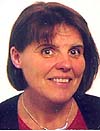
Dr. Anna Lindberg, Director on a 50 % basis for SASNET from 1 July 2007, also joined the Centre for East and South-East Asian Studies as a post-doc researcher from the same date. However, from 2010 she has no formal connection to ACE, but is employed on 100 % by SASNET.
Before coming to Lund University in 2007, Anna worked for a few years as Assistant Professor at the Department of History, Penn State University, USA. In her current research work, Dr. Anna Lindberg is partly affiliated to the Centre for Development Studies in Thiruvananthapuram, Kerala, India.
Personal web page.
Anna Lindberg defended her doctoral dissertation, titled ”Experience and Identity: A Historical Account of Class, Caste, and Gender among the Cashew Workers of Kerala, 1930-2000” at the Dept. of History, Lund University on 13 October 2001. Faculty opponent was Professor Umadevi Sambasivan, Dept of Economics, Kerala University. The project had been carried out under the auspices of the Center for Development Studies in Thiruvananthapuram, Kerala, India. Read an abstract of the dissertation.
The dissertation was later published as a monograph by NIAS Press, Copenhagen, 2003. More information on the book. It was reviewed by Manja Bomhoff in IIAS Newsletter No. 43 (Spring 2007). Read the review (as a pdf-file).
In the Spring 2003 the Swedish Royal Academy of Letters, History and Antiquites (Vitterhetsakademin) awarded one of its 250th Anniversary 2003 grants in Aid of Research to Anna Lindberg. She was awarded SEK 25 000 for her doctoral thesis, considered to be excellent.
Besides, she has been teaching in the fields of South Asian and Gender Studies at Lund University since 1994, and at the 10 credits undergraduate social science course on India/South Asia at Österlen Folk high school in Tomelilla. She has travelled to India with successive classes of undergraduate students and supervised their fieldwork.
In 2002 Anna Lindberg became a Visiting Scholar at the Dept of History, University of Pennsylvania in Philadelphia, USA, and in 2005 she began teaching courses in World History, History of India, and Gender Studies at the Division of Arts & Humanities, Penn State University, Campus Altoona, Pennsylvania, where she worked as Assistant Professor of History and Women’s Studies.
Her research has focused on migration from the Indian subcontinent to the U.S. during the last part of the 20th century, with a gender perspective. Especially, she focuses on issues of Social history, like family formation and marriages, plus theories on Ethnicity and Identity.

 She is currently (2011) completing a research project titled ”Marriage traditions in South India from 1930 to the present”. In November 2003 she was given a grant for SEK 1,4 million by the Bank of Sweden Tercentenary Foundation (Stiftelsen Riksbankens jubileumsfond), for this project, and in November 2005 Dr. Lindberg received another SEK 1.8 Million as a three-years research grant from Sida/SAREC to continue with this project during the period 2006-08. More information about the 2005 Sida grants.
She is currently (2011) completing a research project titled ”Marriage traditions in South India from 1930 to the present”. In November 2003 she was given a grant for SEK 1,4 million by the Bank of Sweden Tercentenary Foundation (Stiftelsen Riksbankens jubileumsfond), for this project, and in November 2005 Dr. Lindberg received another SEK 1.8 Million as a three-years research grant from Sida/SAREC to continue with this project during the period 2006-08. More information about the 2005 Sida grants.
Project abstract: This study aims at exploring marriage customs and their material, ideological, and discursive consequences among selected communities in Kerala. It will mainly focus on the past forty years, but will set the historical background by tracing changes since the beginning of the twentieth century. The past four decades are of particular interest as a period of modernization and globalization, as well as a time when political identities have been increasingly based on religion or caste. In the context of Kerala, global processes since the 1960s are characterized by a large number of individuals who have migrated to the West (mostly Christians and Hindus) or to Arabian Gulf countries (mainly Muslims) for varying periods of time. The general flow of communication, tourism, and media are other aspects of cultural globalization in Kerala.
Originally encompassing both Kerala and Karnataka, it has been reformulated as a more intensive study of Kerala, including issues of globalization. Kerala is of specific interest for several reasons. The state is known for its positive social indicators and for the relatively high status of women there. Within the three main religious groups are communities with matrilineal and patrilineal traditions that reach into the mid-twentieth century. This is particularly important because property in matrilineal communities was owned by women and then transferred to the next generation through the female line. From an initial study focusing on marriage payments, it has broadened to include other cultural and religious factors contributing to the identity-creating processes. Class, caste, gender, and religious identities are seen as fluent and changing. Because of the pivotal importance of marriage in these identities, marriage payments will remain a dominant feature of the study.
One of the most serious problems in conjunction with the subordinate position of women in Indian society is the question of dowry. During the past few decades, there have been frequent reports of women being abused, victimized, and even murdered because of disputes related to dowry. Sex-selective abortions, female infanticide, reluctance to educate girls, and violence are other phenomena generally considered to be outcomes of the dowry system. Lesser forms of oppression include denial of property rights, barring women from higher education, and depriving them of resources they have inherited or earned. All are examples of the structural violation of human rights. From a Western point of view, the phenomenon of dowry appears as the practice of a traditional society – something that will disappear with “modernization”. Marion Kaplan has argued that the dowry system declined radically when large numbers of European women entered the labor market as part of what was considered the modernization process. In India, on the other hand, dowry has been taken up in recent years by groups who did not have this “tradition” during the early twentieth century. Laws concerning marriage, divorce, custody, family systems, and succession are not uniform in India, but differ among the various religions and from community to community. These have been continuous topics of discussion since Independence, making the study of marriage, along with its economic, symbolic, and discursive consequences, a complex and challenging task.
During September 2010, SASNET’s Director, Dr. Anna Lindberg, spent one month at the Centre for Gender Studies, Kerala University, India. Anna was selected for a scholarship by the Erasmus Mundus Indo-European mobility program Lot 13 administered by Lund University (more information). At Kerala University, Anna collected research material for a forthcoming book on gender issues in South India. She also gave a guest lectures at the Centre for Development Studies (CDS) in Thiruvananthapuram. She talked about ‘The Marriage of Children in Late Travencore: Gender Discourses, Dowry, and the Commercialization of Marriage‘. See the poster for her September 20th seminar at CDS.
While in Kerala, Anna was interviewed on her research work by the journalist Bhawani Cheerath. Read the article ”An ‘insider’ in Kerala” that was published in The Hindu on 18 September 2010.
Anna Lindberg is one of six researchers at Lund University and University of Gothenburg that were awarded a major three-years grant for a project on Asian Migration by the Swedish Research Council for research within the fields of Educational Science 2010. The decision was taken on 21 October 2010. The project, entitled ”Transnational Mobility of Higher Education within Asia: An Interdisciplinary Study of Strategies and Educational Conditions among Young Persons” will be carried out during the period 2011-13, and the total sum awarded is SEK 5.68 m.
This interdisciplinary project, led by Dr. Leif Stenberg, Center for Middle Eastern Studies (CMES), aims to study the transnational mobility of higher education within Asia by taking a perspective that situates individuals at the centre. It will investigate young people’s strategies, experiences, and visions, with individual studies based on fieldwork and data collection in India, Indonesia, Malaysia, Nepal, Syria, Thailand, and Turkey. The South Asian angle will be provided by Anna Lindberg. Two other researchers at the Centre for East and South-East Asian Studies are also members of the research, namely Dr. Ann Kull (on Indonesia), and Dr. Monica Lindberg Falk (on Thailand).
The SASNET Director will make an individual study of the situation for Nepalese students at some of the major universities in India, focusing on identity creating processes. She will try to illustrate differences, similarities and overlapping between the stories of male and female students, what role the nation plays for them, and what visions they carry for the future. The stories of the Nepalese students wil be put into a context, where the Nepalese policy for higher education and the country’s relation to India is highlighted, especially in the case of possible discrimination of Nepalese students.
More information about the project.
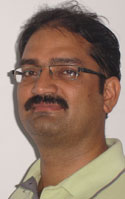 Dr. Vipin Negi worked as a post-doc researcher at the Centre during the period September 2009 to June 2010 in the framework of the European Commission funded Erasmus Mundus External Cooperation Window Programme lot 13 (administered by Lund University).
Dr. Vipin Negi worked as a post-doc researcher at the Centre during the period September 2009 to June 2010 in the framework of the European Commission funded Erasmus Mundus External Cooperation Window Programme lot 13 (administered by Lund University).
Vipin is an Assistant Professor of Economics in Keshav Mahavidyalaya College at the University of Delhi, India. He received a PhD in Economics from Jamia Millia Islamia Central University, New Delhi in 2003. Now, he teaches on Micro Economics, Macro Economics and Indian Economy. His primary research interests are foreign portfolio investment and foreign direct investment to India. He is working on the main determinants of inward foreign direct investment to India during the post-reform period.
At ACE, Vipin worked on a project regarding the issue of rapid expansion of service sector as the largest sector in terms of its contribution in GDP in India in the last 20 years and its implications on the nature and direction of the development process of India’s economy.
He was also involved in a study of the implementation of the National Rural Employment Guarantee Act (NREGA) in India. On Thursday 18 February 2010 he held an open lecture at Lund University on ”The Implementation of NREGS (National Rural Employment Guarantee Scheme) in India – Some Ground Realities”. More information.
During the period September–October 2009, Dr. Swati Banerjee was another post-doctoral research fellow at ACE. Just like Dr Negi, she came to visit the Centre in the framework of the Erasmus Mundus External Cooperation Window Programme. Dr. Bannerjee is Assistant Professor at the Centre for Community Organisation and Development Practice, School of Social Work, Tata Institute of Social Sciences (TISS) in Mumbai, India. Recently, she has been a visiting fellow at the Centre for Women’s and Gender Studies, University of British Columbia, Vancouver, Canada.
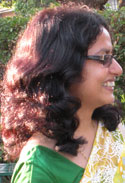 She did her masters in Social Work with specialization in Urban and Rural Community Development from TISS, Mumbai, India and PhD in Rural Development from the University of Mumbai on ‘Relationship Between Environment, Quality of Life and Gender of Indigenous Communities in India’. Also participated in several national and international conferences and research/study programmes including a programme on Gender Studies at the International Women’s University (ifu), University of Kassel, Germany and a programme on Environment and Development at Schumacher College, U.K. Received fellowships from Ford Foundation, German Academic Exchange Service (DAAD), Indian Council of Social Science Research (ICSSR) etc.
She did her masters in Social Work with specialization in Urban and Rural Community Development from TISS, Mumbai, India and PhD in Rural Development from the University of Mumbai on ‘Relationship Between Environment, Quality of Life and Gender of Indigenous Communities in India’. Also participated in several national and international conferences and research/study programmes including a programme on Gender Studies at the International Women’s University (ifu), University of Kassel, Germany and a programme on Environment and Development at Schumacher College, U.K. Received fellowships from Ford Foundation, German Academic Exchange Service (DAAD), Indian Council of Social Science Research (ICSSR) etc.
Swati is associated with several grassroots organisations in India working with Indigenous communities and poor urban and rural communites with a focus on women. She is also part of the task force of the Government of Maharashtra, India to look into issues of gender, livelihood and Self Help Groups.
Major areas of research interests include Gender and Development with a focus on women’s collectives; Environment and Livelihood issues of Indigenous Communities in India. Major publications include, ‘The Impact of depleting environment and changing patterns of life on the access to food of the Katkari tribal community in Raigad, Maharashtra , Change, transformation and Collective Action Towards Empowerment of Women etc.
While at ACE, she wrote a working paper entitled “‘Bourgeois Utopias’? The rhetoric of globality in the contemporary suburban landscape of Calcutta”. The paper is published on the Internet, go for it!

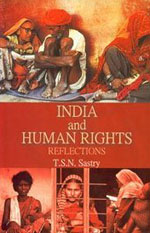 Another Indian researcher, Prof. T.S.N. Sastry, Head of the Department of Law, University of Pune, came to Lund University as a Erasmus Mundus scholarship holder in July 2010. He stayed for one month at the Centre for East and South-East Asian Studies, and worked closely with Prof. Roger Greatrex, with whom he established contact during Prof. Greatrex’s visit to the University of Pune in 2009 (also travelling on an Erasmus Mundus scholarship).
Another Indian researcher, Prof. T.S.N. Sastry, Head of the Department of Law, University of Pune, came to Lund University as a Erasmus Mundus scholarship holder in July 2010. He stayed for one month at the Centre for East and South-East Asian Studies, and worked closely with Prof. Roger Greatrex, with whom he established contact during Prof. Greatrex’s visit to the University of Pune in 2009 (also travelling on an Erasmus Mundus scholarship).
Prof. Sastry has published a volume entitled ”India and Human Rights. Reflections” in 2005. In October 2011, he again spent one month as a Erasmus Mundus scholarship holder at ACE, Lund University.
As mentioned above Dr. Jan Magnusson, closely connected to SASNET from the beginning (being its first webmaster, and for the past few years being a member of the board), was based at the Centre for East and South-East Asian Studies (ACE) from 2003 till 2005, coordinating the Masters programme in Asian Studies. Since 1 January 2006 he is however School of Social Work, his home institution.
Jan Magnusson is involved in a couple of South Asia related research projects, one focusing on Tibetans in India, and another one on the Baltistan movement in north Pakistan. More information about his research work.
Masters programme in Asian Studies – with a South Asian track
Full information about the Masters programme, with detailed information on the courses at the track for South Asian studies. Deadline for application for the Autumn 2011 intake was 1 February 2011.
Contact person: Monica Lindberg Falk.

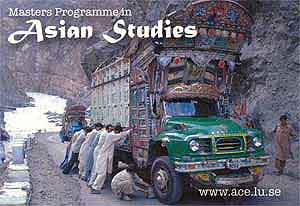 From 2007 the Centre for East and South-East Asian Studies organises a 120 ECTS credits Master’s Programme in Asian Studies at Lund University, with two tracks – one for East and South-East Asian studies, and one for South Asian studies. Together they admit 60 new students every year.
From 2007 the Centre for East and South-East Asian Studies organises a 120 ECTS credits Master’s Programme in Asian Studies at Lund University, with two tracks – one for East and South-East Asian studies, and one for South Asian studies. Together they admit 60 new students every year.
It is an interdisciplinary master programme focusing on political, economic, social, and cultural issues in Asia. The interdisciplinary character of the programme, the focus on contemporary Asia, and the possibility to conduct fieldwork in Asia, make the master programme in Lund unique in Europe. It is the only English language programme of its kind in the Nordic countries.
The programme is aimed at students who after their undergraduate studies want to gain area expertise on contemporary Asian societies. The programme permits students to specialise based on their regional, thematic and disciplinary interests. It provides students with advanced knowledge about contemporary issues in Asia with the objective that they will acquire the background knowledge and concrete skills necessary to understand, assess and analyse social, economic and political developments in the region.
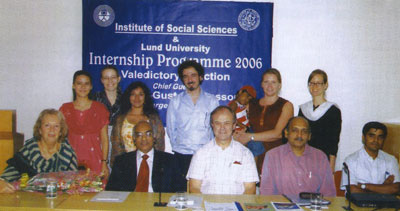 The field work is normally carried out during the third semester in South Asia. The Centre has agreements with a number of institutions, among them the Institute of Social Science (ISS) in New Delhi, India, allowing the Lund University students to stay at ISS on an internship programme basis. The photo to the right shows the 2006 student group to ISS. The ISS Director, Dr. George Mathew is seated second from left, flanked by Mr. Carl-Gustaf Svensson from the Swedish Embassy, Mrs. Svensson, and ISS faculty.
The field work is normally carried out during the third semester in South Asia. The Centre has agreements with a number of institutions, among them the Institute of Social Science (ISS) in New Delhi, India, allowing the Lund University students to stay at ISS on an internship programme basis. The photo to the right shows the 2006 student group to ISS. The ISS Director, Dr. George Mathew is seated second from left, flanked by Mr. Carl-Gustaf Svensson from the Swedish Embassy, Mrs. Svensson, and ISS faculty.
From November 2010, ACE has an agreement with the School of Social Work, Tata Institute of Social Sciences (TISS) in Mumbai, India, for it to be new host for the fieldwork by those ACE masters students who wish to do India projects.
The programme has been successfully run at Lund University since the Fall 2003, but until the 2006 courses lasted only for three semesters (as a so-called ”Magisterutbildning med bredd”).
During the academic year 2011-12, Dr. Sidsel Hansson coordinates the South Asia related courses within the programme, but teachers have come from several other departments at Lund University. They include Dr. Ted Svensson, Dept of Political Science. Researchers from academic institutions in Copenhagen have also frequently been invited to do lectures. Among them are Dr. Stig Toft Madsen, Nordic Institute for Asian Studies, NIAS.
The eighth batch of students did their field work in South Asia during the Fall 2011, whereas the ninth batch started its courses on September, 1, 2011.
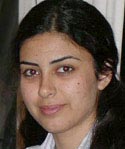
 The first batch of students from the Masters Course in Asian Studies, South Asian track, that started in September 2003, carried out their field work in different parts of South Asia during the Fall 2004. One of the students, Behnoush Payvar (photo to the right) wrote a MA thesis entitled ”The Newspaper Coverage of Gender, Environment and Development Issues in India” as part of a research project led by Dr. Sidsel Hansson.
The first batch of students from the Masters Course in Asian Studies, South Asian track, that started in September 2003, carried out their field work in different parts of South Asia during the Fall 2004. One of the students, Behnoush Payvar (photo to the right) wrote a MA thesis entitled ”The Newspaper Coverage of Gender, Environment and Development Issues in India” as part of a research project led by Dr. Sidsel Hansson.
Behnoush is now a doctoral student at the University of Tübingen in Germany, where she is pursuing a project dealing with Iran, about youth in Tehran, norms, perceptions and values. Prof. Håkan Hyden at the Division of Sociology of Law, Lund University is her co-supervisor.

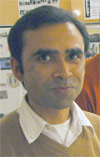 Keshab Prasad Bhattarai (photo to the left) was a student in the second batch, and carried out field work in the Fall 2005. Keshab, hailing from Nepal, wrote his MA thesis on the conflict in Nepal. In May 2006, he published an article at Heidelberg University Nepal Research web site on Armed Conflict and Migration: A threat for development and peace. A case of Nepal. Read the article (as a pdf-file)
Keshab Prasad Bhattarai (photo to the left) was a student in the second batch, and carried out field work in the Fall 2005. Keshab, hailing from Nepal, wrote his MA thesis on the conflict in Nepal. In May 2006, he published an article at Heidelberg University Nepal Research web site on Armed Conflict and Migration: A threat for development and peace. A case of Nepal. Read the article (as a pdf-file)
Mr. Bhattarai has now returned to Nepal, but keeps his Swedish connections, being country representative for the Swedish Organisation for Individual Relief, SOIR (IM in Swedish), a development assistance organisation based in Lund. In Nepal, SOIR since 40 years runs a school in the village Wahaki in Parbat, a remote district of western Nepal. From February 2007 this school has been expanded with new buildings, and during 2010 it will turn into a community college, that will have an academic collaboration with Tribhuvan University in Kathmandu, besides also two Swedish folk high schools, Österlen folk high school in Tomelilla and Helliden folk high school in Tidaholm. Keshab is in charge of the Wahaki college and other projects that SOIR is engaged with in the country. 
 Ingibjorg Stefansdottir (photo to the right) was a student from the second batch of Masters students in Asian studies at ACE. She participated in the SASNET workshop on ”The role of South Asia in the internationalisation of higher education in Sweden” held in Stockholm 28-29 November 2006, and gave a report about her student’s experiences from both a summer course arranged by the Nordic Centre in India (NCI) in Hyderabad, and Lund Masters programme fieldwork in India.
Ingibjorg Stefansdottir (photo to the right) was a student from the second batch of Masters students in Asian studies at ACE. She participated in the SASNET workshop on ”The role of South Asia in the internationalisation of higher education in Sweden” held in Stockholm 28-29 November 2006, and gave a report about her student’s experiences from both a summer course arranged by the Nordic Centre in India (NCI) in Hyderabad, and Lund Masters programme fieldwork in India.
Read Ingibjorg Stefansdottir’s presentation at the workshop (as a pdf-file)
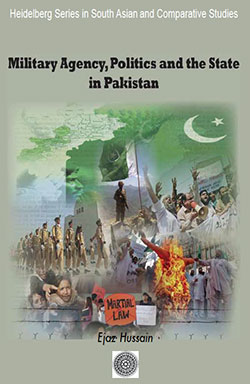 Ejaz Hussain received his MA in Asian Studies in 2006. He then joined the Department of Political Science at the South Asia Institute, Heidelberg University in Germany, and defended his dissertation entitled ”Military Agency, Politics and the State: The Case of Pakistan” in 2010 (read the full-text thesis).
Ejaz Hussain received his MA in Asian Studies in 2006. He then joined the Department of Political Science at the South Asia Institute, Heidelberg University in Germany, and defended his dissertation entitled ”Military Agency, Politics and the State: The Case of Pakistan” in 2010 (read the full-text thesis).He later became Assistant Professor of Political Science at Forman Christian College in Lahore, and at COMSATS Institute of Information Technology in Islamabad. In 2013, his dissertation is republished by Samskriti, New Delhi, as a book in the Heidelberg University Series in South Asian and Comparative Studies. More information about the book.
The book seeks to explain why the military intervenes in Pakistan’s politics. Ejaz argues that it intervenes in Pakistan’s politics for its own political interests. The military instrumentalizes its political power to maximize its economic interests as an independent actor. Moreover, the present study has, quite contrary to the existing structuralist, legitimist, path-dependent, generalist, instrumentalist and conspiracy works on Pakistan’s politics and the state, posited that it is the military agency, not structure/culture, which causes a coup/intervention.
Elizabeth Williams Ørberg  (photo to the right) was a student on the Masters Programme in Asian Studies at ACE during the period 2005–07, and she wrote a Master thesis entitled ”The ‘Paradox’ of Being Young in New Delhi. Urban Middle Class Youth Negotiations with Popular Indian Film”. The thesis is published as a working paper on the Internet, go for it.
(photo to the right) was a student on the Masters Programme in Asian Studies at ACE during the period 2005–07, and she wrote a Master thesis entitled ”The ‘Paradox’ of Being Young in New Delhi. Urban Middle Class Youth Negotiations with Popular Indian Film”. The thesis is published as a working paper on the Internet, go for it.
Since 2009, Elizabeth Williams Ørberg is a PhD candidate at the Dept. of Anthropology, Archaeology and Linguistics, Aarhus University, Denmark. Her doctoral dissertation project is entitled ”Transgenerational transmission of Buddhism among Ladakhi youth in India”. Elizabeth is part of a larger research group at Aarhus Univeristy working on a major project entitled ‘Buddhism and Modernity: Global Dynamics of Transmission and Translation‘.
Project abstract: This project studies Himalayan Buddhist youth as they negotiate practices of religion amid transforming social realities in moving from the traditional mountain village in Leh, Ladakh to the cosmopolitan capital of India, Delhi. Following the lives of young Ladakhis as they seek educational opportunities in Delhi, this study seeks to present a more nuanced understanding of how religion informs and shapes the everyday social practices of young Ladakhi Buddhists, and also how Buddhist institutions, beliefs and practices themselves are becoming transformed in the process.

Kathryn Dominique Lum, originally from Canada, was yet another student completing the Masters programme in 2007. The title of her thesis was ”Learning Gender in Punjab: A Study of a Modern Gender Regime”. She has after this completed a PhD dissertation project at the European University Institute in San Domenico di Fiesole, Italy. Her dissertation project is entitled ”How Caste Works: Forging New Identities in a Punjabi Ex-Untouchable Community in Catalonia, Spain”. In the thesis, she fruitfully uses Ambedkar’s ideas about the emancipation of the pariah groups in India as hypotheses for her work. She compares the contrast between on the one hand ‘passing’ as a strategy for those socially and geographical upward mobile with on the other hand the ‘pride’ movement in India and in Spain.
She will defend her thesis on Monday 10 October 2011.
Abstract: The thesis is an ethnographic study of an ex-untouchable group from the Punjab region of India known as the Ravidassias. Its aim is twofold: on the one hand to elucidate the mechanisms of caste in social life and in particular, to analyse how ex-untouchables negotiate caste stigma, and on the other, to explore the caste, gender, and youth dimensions of the Ravidassia community in Catalonia, Spain. It is comparative in nature, discussing caste, the management of caste stigma, and the Ravidassia sociocultural/religious movement in the Punjab, India and Catalonia, Spain.
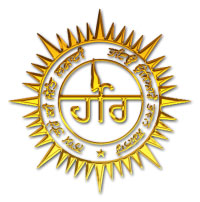 The Ravidassia community is an interesting case study for the study of caste, because the Ravidassias are the most important former untouchable group demographically in both the Punjab and in the diaspora. They have also become in the postwar period one of India«s most economically and socially assertive «Scheduled Caste« or SC caste groups, an assertion which is articulated symbolically in the field of religion. The Ravidassias are thus an excellent example of a transnational group whose diaspora status is playing a key role in changing the caste status quo in their native Punjab. In focusing on the individual experience of caste stigma, this thesis seeks to highlight an aspect of caste discrimination that is frequently overlooked in debates on «casteism«, and to reveal how Dalits who are now educated and middle-class still struggle with the legacy of untouchability.
The Ravidassia community is an interesting case study for the study of caste, because the Ravidassias are the most important former untouchable group demographically in both the Punjab and in the diaspora. They have also become in the postwar period one of India«s most economically and socially assertive «Scheduled Caste« or SC caste groups, an assertion which is articulated symbolically in the field of religion. The Ravidassias are thus an excellent example of a transnational group whose diaspora status is playing a key role in changing the caste status quo in their native Punjab. In focusing on the individual experience of caste stigma, this thesis seeks to highlight an aspect of caste discrimination that is frequently overlooked in debates on «casteism«, and to reveal how Dalits who are now educated and middle-class still struggle with the legacy of untouchability.
During the course of her research, Kathryn found that a significant portion of the global Ravidassia community, including the Spanish Ravidassia community, chose to break with Sikhism and form a completely autonomous religious identity. I thus had the privilege to witness a profound identity shift on the part of my interviewees which has seen new forms of caste pride emerge that would have been unthinkable only a generation ago. This ethnographic study reveals that while caste prejudice/stigma has not diminished with migration, caste as institution and social organisation has assumed new forms that can be strategically used by those who were once completely crushed by the caste system
In June 2010, she participated in the conference on ”Sikhs in Europe. Migration, Identity and Translocal Practices”, that was held at Lund University. The conference was organised by the Centre for Theology and Religious Studies (CTR) at Lund University, and had an aim to gather leading scholars in the multidisciplinary field of Sikh studies and discuss current research projects focusing on patterns of migration, identity formations, self-representations, transmission of traditions and translocal practices among Sikhs in different parts of Europe. One of the conference days was dedicated as a workshop for PhD students affiliated to European universities. More information.
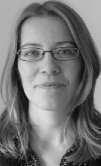 Louise Nolle also completed the Masters programme in 2007. Her Masters thesis, based on field work in Karnataka, India, focused on women’s political participation in local government. It was entitled ”’The Two-Sided Family’: The Impact of the Family and Everyday Life on Women’s Political Participation in Rural Karnataka”. The thesis is published as a working paper on the Internet, go for it.
Louise Nolle also completed the Masters programme in 2007. Her Masters thesis, based on field work in Karnataka, India, focused on women’s political participation in local government. It was entitled ”’The Two-Sided Family’: The Impact of the Family and Everyday Life on Women’s Political Participation in Rural Karnataka”. The thesis is published as a working paper on the Internet, go for it.
Louise also holds a Master’s degree in Social Anthropology from Copenhagen University, Denmark, and in 2006, she joined the Danish NGO, The Swallows, as a volunteer. She hopes to proceed with research on PhD level.

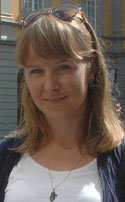
Eleonor Marcussen completed the Masters programme in 2008. Her Masters thesis was entitled “Learning for life: Parents’ perceptions of their children’s education”. After that, during the period 2008-09 she also completed a MA course in Hindi at Uppsala University, and wrote a thesis entitled “Gender as a genre in women’s oral tradition in India”.
Since June 2009, Eleonor is a PhD candidate at the The Cluster of Excellence ”Asia and Europe in a Global Context: Shifting Asymmetries in Cultural Flows” at Heidelberg University, Germany.
Eleonor is a member of the Junior Research Group “Cultures of Disaster. Shifting Asymmetries between Societies, Cultures, and Nature from a Comparative Historical and Transcultural Perspective”. More information.
The working title of her PhD thesis project is entitled “Participation, governance and social change in relief work and reconstruction after natural disasters in late colonial India (19th-20th centuries)”. More information.
Sebastian Kästner also completed the programme in 2008. He is now working as Regional Coordinator South Asia, for INWENT (Internationale Weiterbildung und Entwicklung gGmbH) a non-profit organisation with worldwide operations operations dedicated to human resource development, advanced training, and dialogue. Inwent is commissioned by the German Federal Government, the German business sector, and the German Länder. INWENT is based at Bonn.
Mathew Abraham is now (2011) a PhD fellow at Copenhagen Business School (CBS). He is working on a project entitled ”Globalization, Structural Changes and Collective Action: A Study of Producer Organisational Formats in India”.
In the context of his research, Mathew uses the theory of collective action to explore how small agri-producers in developing countries come together by pooling in their resources to achieve economies of scale for better market access and navigate structural issues. Ideally, in the context of globalization and the rapidly changing agribusiness scenario, scaling up production is one way to improve access, meet the market requirements to achieve product competitiveness and attain food security. Therefore, it is important to understand the conditions under which collective action can be successful and could contribute towards sustainability.
Masters students 2008–2010
In June 2010, another batch of Masters students completed their programme at ACE. Among them some focused on South Asia in their thesis work, such as:
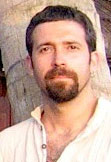 – Geoffrey Gardella (photo to the right), who wrote a thesis on ”Cooking Like the Neighbors: Culinary Adaptation Among South Indians in Delhi”. Mr. Gardella is both a geographic and academic wanderer. With a master’s degree in German from University of California Berkeley, he has also studied Hindi in Mussoorie and Saami at Umeå University. In between academic careers, he has worked in Silicon Valley. While at ACE, his area of focus has been the intersection of food, culture and identity in India. He participated in the June 2009 Asian Dynamics Initiative conference at the University of Copenhagen, where he presented a paper entitled ”Udupi Hotels: Entrepreneurship, Reform and Revival”, written together with Stig Toft-Madsen from SASNET.
– Geoffrey Gardella (photo to the right), who wrote a thesis on ”Cooking Like the Neighbors: Culinary Adaptation Among South Indians in Delhi”. Mr. Gardella is both a geographic and academic wanderer. With a master’s degree in German from University of California Berkeley, he has also studied Hindi in Mussoorie and Saami at Umeå University. In between academic careers, he has worked in Silicon Valley. While at ACE, his area of focus has been the intersection of food, culture and identity in India. He participated in the June 2009 Asian Dynamics Initiative conference at the University of Copenhagen, where he presented a paper entitled ”Udupi Hotels: Entrepreneurship, Reform and Revival”, written together with Stig Toft-Madsen from SASNET.
In 2009, Geoffrey Gardella was engaged with a short-term assignment for SASNET to assist the webmaster, Lars Eklund, to improve the graphic design on important SASNET web pages.
– Emilija Zabiliute, who has written her thesis on ”I am Dalit, How are You? Identity Representations in Dalit Human Rights Movement”. She has since joined a PhD programme at the Department of Cross-Cultural and Regional Studies, University of Copenhagen.
– Maria Mikkelsen, who has written her thesis on ”The world will turn in to nature, everyone turns away from chemicals. Aspiration and values among organic farmers in India”.
– Sean Nevins, who has written his thesis on ”Safety and Traumatic Stress Among Journalists in Pakistan & Afghanistan”.
– Weibin Wang, who has written his thesis on ”Rebuild a Home in Delhi: Towards better Resettlement of the Urban Poor”.
– Asiful Basar, who has written his thesis on ”Climate Change, Loss of Livelihood and the Absence of Sustainable Livelihood Approach: A Case Study of Shymnagar, Bangladesh”.
Masters students 2009–2011
In June 2011, another batch of Masters students completed their programme at ACE. Among them a few focused on South Asia in their thesis work, such as:
– Muhammad Zia Ullah, who wrote his thesis on ”Gender Disparity in Primary and Secondary School Enrollment in Rural and Tribal Pakistan (Barriers in the way of rural and tribal girls’ enrollment in schools)”. Zia Ullah participated in SASNET’s third conference for young Nordic scholars held in Falsterbo in August 2011 (more information), and presented part of the material from the thesis. Go for the full-text thesis.
